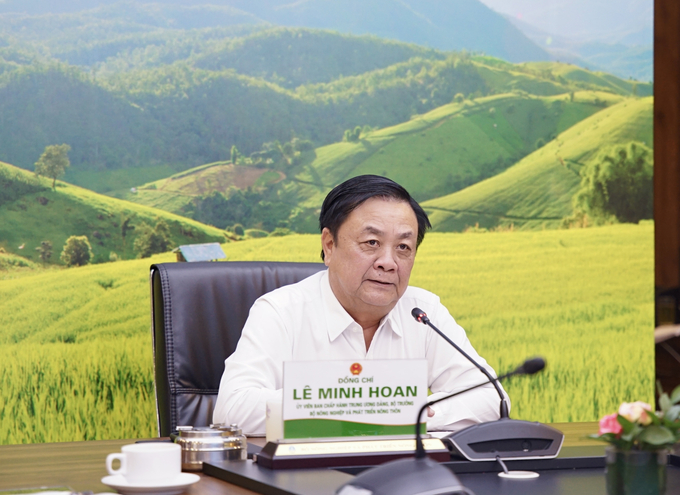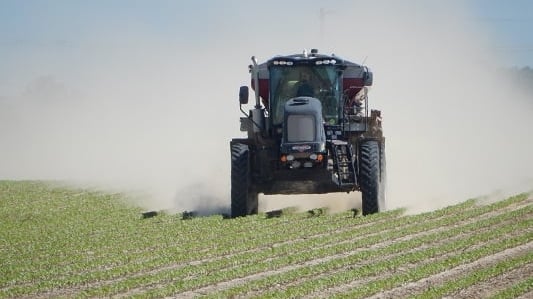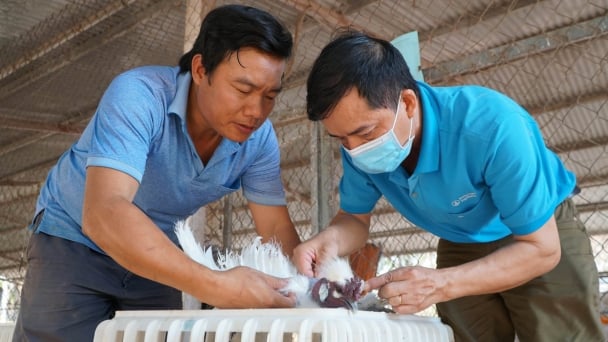May 14, 2025 | 11:59 GMT +7
May 14, 2025 | 11:59 GMT +7
Hotline: 0913.378.918
May 14, 2025 | 11:59 GMT +7
Hotline: 0913.378.918

The first meeting of the Steering Committee for product quality, food safety, and market development was convened by MARD on April 11.
Minister Le Minh Hoan, Deputy Minister Tran Thanh Nam, and leaders of the Department of Quality, Processing, and Market Development were in attendance at the meeting.
During the meeting, Le Minh Hoan, minister of MARD, highlighted three significant "changes" that pose the greatest challenges to the agriculture sector: climate change, market change and change of global consumption trend.
"As we transition from agricultural production to agricultural economy and market thinking, market optimization emerges as the most significant challenge amidst the increasing difficulties of the market. In meanwhile, this matter pertains to the standards of aquatic, agricultural, and forestry products. The market is not just a place of exchange between sellers and buyers, but also a consumer culture, influenced by the psychology of consumers in different contexts, divided into many branches and niches... Therefore, if we do not understand these 'niches,' it is difficult to capture individual, distinctive markets," the Minister commented.
Enterprises, associations, government agencies including the MARD, the Ministry of Industry and Trade, the Ministry of Foreign Affairs, Vietnamese embassies, and trade offices overseas are urged by the Minister to increase the integration of their market activities. The Minister proposes that in order to enhance its market approach, the Department of Quality Management, Processing, and Market Development ought to engage in more extensive international relations.
"The time has come to divide markets into the following categories: opportunity markets, potential markets, and niche markets...Requirements such as combating illegal, unreported, and unregulated fishing (IUU), the European Union's regulation on illegal logging (EUDR)... are signs of the world barrier heat. Therefore, it demands that products not only be abundant, tasty, and high-quality as they were 5 - 10 years ago but also require social responsibility," Minister Le Minh Hoan shared.
Director of the Department of Quality Management, Processing, and Market Development, Mr. Nguyen Nhu Tiep, briefed attendees on the current state of affairs and oversaw the operations of the departments responsible for quality assurance, food safety, processing, and market development.
Mr. Tiep noted notable advancements in the fields of agriculture, forestry, and aquatic products in comparison to prior years, with particular emphasis on the period since 2016, when the National Assembly enacted strategic measures and strengthened rigorous oversight of food safety. Indicators derived from statistics demonstrate a substantial improvement in food safety. As an example, the percentage of establishments and products that complied with food safety standards for agricultural, forestry, and aquatic products increased to 92% and 99.6%, respectively, in the initial quarter of 2024. Furthermore, more than 2,500 secure agricultural and aquatic supply chains were maintained. Moreover, ongoing efforts are being made to promote market entry; as of now, agricultural, forestry, and aquatic products from Vietnam are available in 190 countries and territories.
This provides substantiation for the dedication and endeavors of the government, in conjunction with pertinent agencies, to guarantee food safety for the populace; it contributes to the enhancement of community health and quality of life.
However, the market continues to face certain constraints and difficulties that hinder its expansion. These include unreliable supply sources and product quality, warnings, and returned products; insufficient product diversity to satisfy market demand; unsuitable packaging specifications; high product prices; a relatively low proportion of products with labels and market-recognized brands; logistics expenses continuing to constitute a significant portion of product costs; and so on.
In order to tackle these concerns, a series of precise measures were proposed by the Director of the Department of Quality Management, Processing, and Market Development. These encompass enhancing legal frameworks and mechanisms, such as the Logistics Project or Decree pertaining to agricultural product brands; promptly devising efficient measures to exploit protected and certified brands; and more.
Furthermore, enhancements must be made to the coordination, information dissemination, and training of farmers and production facilities in order to align them with market demands; establish market newsletters; arrange seminars and forums; and establish connections between the production, processing, and consumption of aquatic and agricultural products.

Minister Le Minh Hoan emphasized that associations and industries play an important role in the transition from agricultural production thinking to the agricultural economy.
Mr. Tiep additionally suggested the development and implementation of assessment and transfer frameworks, such as the value chain framework connecting cooperatives in the logistics system and food safety monitoring committees at the commune level.
Deputy Minister Tran Thanh Nam emphasized the fact that importing nations demand that Vietnamese-origin goods adhere to their food safety and hygiene regulations. When purchasing products from Vietnam, however, they conduct business directly with the manufacturers, bypassing state management agencies. Concerns regarding food safety and hygiene are reported to the food safety agencies in Vietnam. The Deputy Minister suggested that the Department of Quality Management, Processing, and Market Development deliberate on establishing a framework to facilitate coordination and close collaboration among the Ministry's food safety agencies, associations, and departments (e.g., the Ministry of Health and the Ministry of Industry and Trade).
Furthermore, Deputy Minister Tran Thanh Nam expresses optimism regarding the formulation of strategies by industries and associations to encourage member engagement in the raw material sector. In order to prevent the occurrence of "buying and selling" in raw material areas, a strategy is required to require each member company to register for raw material areas. This will safeguard the rights of association members and facilitate source traceability. Moreover, in order to guarantee that raw material areas adhere to superior quality and standardization, the Ministry of Agriculture and Rural Development may establish conditions for association members to coordinate with state management agencies in order to implement stringent management. This assistance would include technical support.
Translated by Dieu Linh

(VAN) Vietnam's draft amendment to Decree No. 156 proposes a mechanism for medicinal herb farming under forest canopies, linking economic development to population retention and the sustainable protection and development of forests.

(VAN) In reality, many craft village models combined with tourism in Son La have proven effective, bringing significant economic benefits to rural communities.

(VAN) The international conference titled Carbon Market: International experiences and recommendations for Vietnam was successfully held recently in Ho Chi Minh City.

(VAN) According to the Project on rearranging provincial and communal administrative units, in 2025, the country will have 34 provinces/cities, 3,321 communes, wards, and special zones, and no district-level organization.

(VAN) The vice president of fertilizer with Stone X Group says the Trump administration’s tariffs are impacting fertilizer markets.

(VAN) Resolution 57 offers Vietnam a significant opportunity to narrow the global genetic technology disparity and convert its extensive genetic resources into commercial advantages.

(VAN) The Ministry of Agriculture and Environment will prioritize the implementation of five core and breakthrough solutions in science and technology, in addition to the seven groups of tasks identified in Decision No. 503.